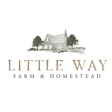
Beyond the Romanticism of the Homestead - Farm Updates, Accountability and More.
On this episode of the Little Way Farm and Homestead Podcast, Mathew and Carissa have a genuine and honest conversation. Discussing farm updates, their developing experiences of rural living and the the evolving maturity that comes with pursuing a vocation of marriage. This conversation begins light hearted and becomes a bit more serious around the midway point. It's a conversation of hope and one that acknowledges the potential for disorder and fatigue, as well as fun in life. This episode, we hope, leaves you inspired to keep focused and pursuing a life that God calls you to.
For more information about Little Way Farm and Homestead including the farm, podcast, and upcoming events, check out https://www.littlewayhomestead.com/
For media inquiries, advertising, speaking requests, guest referrals, consulting and more - email us at hello@littlewayhomestead.com

